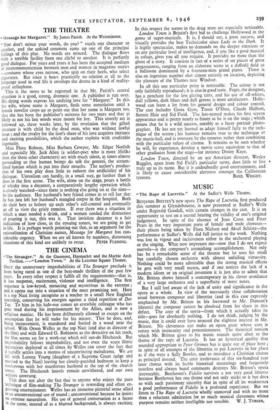MUSIC
The Rape of Lucretia." At the Sadler's Wells Theatre.
BENJAMIN BRI1TEN'S new opera The Rape of Lucretia, first produced this summer at Glyndeboume, is now presented at Sadler's Wells under Reginald Goodall, with certain changes in the cast. It is an opportunity to test on a second hearing the validity of one's original judgement. In spite of the absence of Joan Cross and Peter Pears in the very important parts of female and male choruses— their places being taken by Flora Nielsen and Aksel Schiotz—the performance at Sadler's Wells did full justice to the work. Nothing was lost in vigour and incisiveness either in the 'orchestral playing or the singing. What now impresses me—now that I do not expect marvels—is the composer's astonishing accomplishment. Not only has he a remarkable sense of the theatre but he uses his small but carefully chosen orchestra with almost unfailing virtuosity. Nothing could be more admirable than the strong musical effects he gets with very small means, and if one notices the lack of a modem idiom or an original invention it is just also to admit that Mr. Britten shows himself a contemporary in his clever avoidance of a very large orchestra and a superfluity of mere notes.
But I still feel aware of the lack of unity and significance in the opera as a whole. In view of the necessarily close collaboration
usual between composer and librettist (and in this case expressly emphasised by Mr. Britten in his foreword to Mr. Duncan's libretto) the composer cannot be absolved from his share in this defect. The core of the opera—from which it actually takes its title—goes for absolutely nothing. I do not think, judging by the music, that it could ever have aroused the slightest interest in Mr. Britten. No cleverness can make an opera great whose core is rotten with insincerity and pretentiousness. The theatrical tension which Mr. Britten gives to his music sounds quite alien to the theme of the rape of Lucretia. It has an hysterical quality that sounded appropriate to Peter Grimes but is quite out of place here ;
in spite of all attempts of the librettist to put Lucretia in her place as if she were a Sally Bowles, and to introduce a Christian chorus
as principal instead. The utter irrelevance of this six-hundred year later chorus with its feeble historical mutterings and frequently tasteless and always banal comments destroys Mr. Britten's opera irrevocably. Beethoven's Fidelio survives a not very good libretto because Beethoven has one theme and not only sticks to it but does so with such passionate sincerity that in spite of all its weaknesses a good performance of Fidelio is a profound experience. But we listen to The Rape of Lucretia wholly unmoved and with no more than a reluctant admiration for so much musical cleverness whose purpose remains neither intelligible nor sensible. W. J. TURNER,


























 Previous page
Previous page